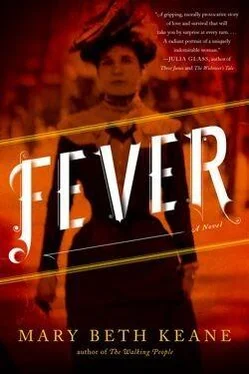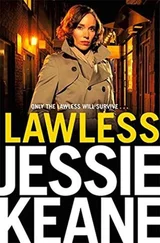“You mean they’re isolating him somewhere in Camden. Somewhere he can be near his family.”
“No, Mary. I mean they’re letting him stay in his own damn house. You understand? With his wife. With his dogs and his sons and his grandchildren. Not a thing has happened to this man except being told not to go near the milk that’s distributed for sale. As for the family’s milk he can do as he pleases. None of them have ever had Typhoid, so your Dr. Soper believes they must be immune.”
“Soper? Soper went up there?” Mary tried to make sense of what she’d just been told. “Hundreds, you said? Hundreds? They say I infected twenty-three.” It was one of the rare times she’d said it out loud.
Nancy piped up. “I think, if I may, that you’re considered, more of a… well, a special case? There’s a bit on you at the end here.” She held out the folded newspaper for Mary to take. “This man knew he had Typhoid forty years ago. He remembers it well. You claim to have never had it at all. So.”
“I claim?” Mary said. She advanced toward the girl with her arm stretched out for the paper, which the girl handed over before backing away. “You can go now, please, and tell the other nurses not to bother coming down here with any more glass canisters for collecting or they won’t like what I do with those canisters when they get here. I’m finished with all that. You understand?”
“I understand.”
When the girl had left, John announced that he was going to sit on the step outside where the air flowed a little easier. “She was trying to help, Mary,” he remarked over his shoulder. “She didn’t have to tell me about that article, but she did. She said she thought you should know.”
“Everybody is trying to help. And look where all their help has landed me.” She scrutinized the back of John’s head for a moment, his sunburned neck, and then, sighing, went over to sit beside him.
“If you hadn’t bit Nancy’s head off, she would have also told you that the article says there are likely many, many more like you and this man up in Camden. It says the Department of Health already has leads on several of them from tracing local outbreaks.”
“And none of them are in quarantine.”
“Nope.”
Mary tried to ignore the reek of her body and looked over at the moon, just an impression yet, the sky still blue around it. Her muscles felt weak from lying in a prone position for so long. She leaned over to the tray John brought with him and broke off a piece of the bread.
“But I was the first so I get the prize.”
“I guess so.”
John plucked a blade of grass and stuck it in his mouth. He leaned back on his elbows and closed his eyes. “I like it out here, days like this. Feels like the country, and this island gets a good breeze compared to over there.” He lifted his chin to indicate the water, the tall buildings on the other, larger island to their west. He sat up. “Oh, before I forget, I cleared a path down on the other side, you know, by that heron’s nest you found that time? It goes all the way down to the beach and you can’t see the hospital from there if you walk down a bit and get the trees between you and it.”
Mary imagined him doing all of this, making progress through the weeds and brambles, overgrowth that had not been touched in years, maybe ever. His arms were berry brown from being outdoors. She wondered sometimes if he was strong enough for all the work he did. Perhaps it was the work that kept him strong. He must be well into his fifties, maybe more, but then Mary remembered that she was almost forty. Forty years old. Her own mother had died at thirty, her nana at fifty-eight. When had he cleared that path, with everything else he was supposed to be doing? He said the board of the hospital wanted primroses along the eastern gable, mums added to the garden. They wanted the lawns cut, the hedges kept trim, everything about the island as neat and orderly as the corridors of the hospital. Riverside was a showpiece hospital, an example to all other hospitals built to house and study contagious diseases. But John had his own way of doing things, just as Mary had her own ways of operating around a mistress who believed she knew her kitchen better than Mary did. If he was wanted for anything, a messenger could always follow the smell of his pipe, which he took out of his shirt pocket now and stuffed with tobacco. So he’d been sure, all along, that she would be back. Or maybe, it occurred to her now, he’d just been hopeful.
“Thank you, John.”
John nodded as he touched his match to the tobacco and drew it alive with short, careful puffs. “Did you see your man over there? At the hearing?”
“I did.”
“Good,” John said. “That’s good.”
• • •
She spent August and September prowling the edges of the island. Every morning started cooler than the last, and soon she had to bring her shawl for warmth. She walked without stockings on the packed sand and held her shoes in her hands as she stepped from smooth stone to smooth stone that led, if she chose to follow, out into treacherous waters. She rested on the southernmost point of the island and found South Brother, the smaller sibling of North Brother. From her point of view the other island looked green and thick and far happier without the insult of quarantine hospitals and daily death. Sometimes, if she was very still, a snowy egret came to stand by her and inspect her, its plumage so pure and beautiful that Mary wondered how it could be an inhabitant of the same place as the other living things, all of which struck Mary as filthy and tired, just as Mary was. Sometimes, with the sun behind the bird and with its plumage on display, the delicate creature glowed and felt to Mary like a sign that good things were possible.
No one ever looked for her anymore. In the beginning, if she didn’t answer the door of her cottage, and couldn’t be found in one of the flower beds close by, they’d send out a search party. “I thought I was free to roam as I please,” Mary would say, furious at yet another promise broken, and doubly angry because they always responded, “You are, of course you are,” even as they led her back by the elbow, the glass canisters clinking in their skirt pockets.
Never in her life had she had so much time. She tried to remember being a child, but even those years seemed full of responsibilities: fetching and boiling water, cleaning, baking, gardening, raking, doing her lessons by the lamp while her nana used her quick knife to separate potatoes from their jackets and pile them high on the table. The nurses never came near her now, and she wondered if that had been part of the judges’ order, the fine print she hadn’t stayed around to read, that although she had to stay within the ordered boundaries, no one was to bother her with tests and analyses, no one was to rap on her cottage door twice a week.
Several weeks after the hearing, the middle of September 1909, Mary got a letter from Alfred. When she saw the mail carrier headed toward her cottage she figured it was just another update from Mr. O’Neill, and didn’t bother hurrying to intercept him. When she saw the handwriting on the envelope, her hands went sweaty. She studied it for a moment, and then she tore it open.
Dear Mary,
I hope they told you I tried to see you at the hotel where they kept you. I don’t know why they wouldn’t let me. I don’t remember if I told you that I thought you looked very beautiful the day that I saw you, and I’d almost forgotten, truth be told, how beautiful you are.
I’m writing now because I’d like to go up there to see you. I had hoped that you’d be free and there wouldn’t be any need but now I worry it will be even longer. Maybe another two years even. Maybe more.
Читать дальше












